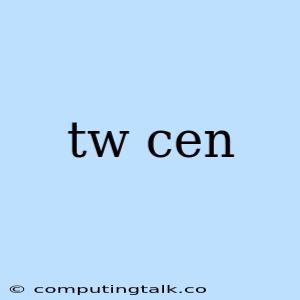Understanding TW CEN: A Comprehensive Guide
The term "TW CEN" often arises in discussions regarding TW CEN standards. It's a crucial element in the world of technical documentation, especially in the context of product safety and compliance. While the acronym itself might seem cryptic at first, understanding its significance is essential for anyone involved in product development, manufacturing, or distribution. This article aims to provide a comprehensive guide to TW CEN standards, explaining what they are, why they matter, and how they impact businesses.
What are TW CEN standards?
TW CEN is a shorthand for "Taiwanese CEN" standards. CEN stands for the European Committee for Standardization. It's a non-profit organization that develops and publishes voluntary technical standards for various industries across Europe.
TW CEN standards essentially represent the adoption and adaptation of CEN standards by Taiwan. They aim to ensure the compatibility and interoperability of products and services between Taiwan and the European Union (EU). By adopting these standards, Taiwan aligns itself with EU regulations, facilitating trade and fostering a common understanding of technical requirements.
Why are TW CEN standards important?
TW CEN standards are essential for several reasons:
- Product Safety and Compliance: They set out safety and performance requirements for products, ensuring consumer safety and protecting the public from potential risks.
- Trade and Market Access: By adhering to TW CEN standards, manufacturers can easily access the EU market and sell their products without facing additional regulatory hurdles.
- Harmonization and Interoperability: TW CEN standards promote harmonization and interoperability between Taiwan and the EU, simplifying product development and reducing costs.
- Enhanced Product Quality: TW CEN standards encourage companies to adopt best practices, leading to higher product quality and improved reliability.
How do TW CEN standards affect businesses?
TW CEN standards have a significant impact on businesses operating in or exporting to Taiwan and the EU. They may need to:
- Adapt their products and processes: Businesses may need to modify their products or production processes to meet TW CEN requirements.
- Implement Quality Management Systems: A robust quality management system (QMS) is crucial for complying with TW CEN standards.
- Obtain Certifications: In some cases, certification from an accredited body is necessary to demonstrate compliance with TW CEN standards.
- Conduct product testing: Products may need to undergo rigorous testing to meet the requirements outlined in TW CEN standards.
What are some common TW CEN standards?
There are many TW CEN standards that are relevant to different industries. Some common ones include:
- EN 60335: Safety of household and similar electrical appliances
- EN 60950-1: Safety of Information Technology Equipment
- EN 55032: Limits and methods of measurement of electromagnetic interference
- EN 61000-3-2: Electromagnetic compatibility for residential, commercial, and light industrial environments
- EN 13782: Safety of toys
Finding and using TW CEN standards
Businesses can access TW CEN standards through various channels:
- The Taiwan Accreditation Foundation (TAF): TAF is the national accreditation body of Taiwan and provides access to TW CEN standards.
- The CEN website: The European Committee for Standardization (CEN) website offers a wide range of standards, including TW CEN standards.
- National Standards Bodies: National standards bodies in Taiwan and the EU can provide information and access to TW CEN standards.
Conclusion
TW CEN standards play a crucial role in facilitating trade, ensuring product safety, and promoting harmonization between Taiwan and the EU. Understanding the importance and impact of these standards is critical for businesses operating in these markets. By adhering to TW CEN standards, companies can demonstrate their commitment to product quality, safety, and compliance, opening doors to international markets and fostering a sustainable and reliable supply chain.
